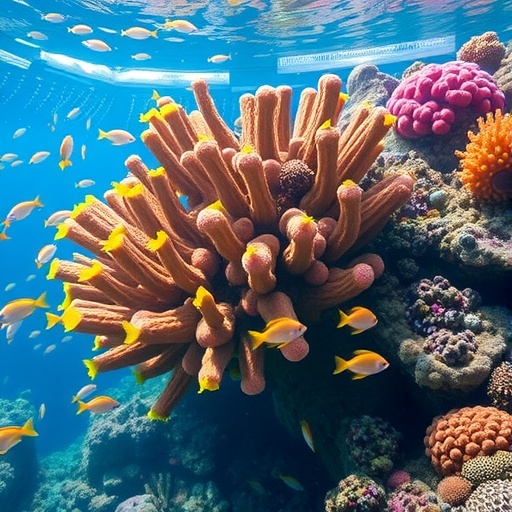In the rapidly evolving dynamics of marine ecosystems, urbanization stands as a formidable force impacting biodiversity, particularly in tropical reef environments. Groundbreaking research conducted by Loong et al. provides critical insights into how urbanization influences the intricate relationships among coral, macroalgae, macroinvertebrates, and fish communities. This comprehensive study, published in the prestigious journal Coral Reefs, serves as a cornerstone for understanding the implications urban development has on marine life, charting a course of investigation that is important for future conservation efforts.
The findings of this research illustrate a multifaceted interplay between the various marine species that inhabit these urbanized areas. Coral reefs, often referred to as the “rainforests of the sea,” serve as the foundational structure within these ecosystems. They not only provide habitats for myriad marine species but also support complex food webs. The study highlights that urban-induced stressors, such as pollution, sedimentation, and altered nutrient dynamics, can significantly disrupt these relationships, leading to a decline in coral health and therefore affecting the entire ecosystem.
Urban coastal developments often lead to increased sedimentation from land runoff, which can smother corals and reduce their capacity for photosynthesis—essential for their survival. Loong et al. meticulously document how these sediment loads impact coral resilience and vitality, showcasing a clear correlation between urban development and declining coral populations. As corals suffer, the repercussions ripple throughout the ecosystem, influencing macroalgal proliferation, which can further complicate the community dynamics.
Macroalgae, thriving in nutrient-rich environments indicated by urban runoff, can outcompete corals for space and resources. This competitive advantage can lead to a shift in community structures, ultimately resulting in a regime shift from coral-dominated reefs to algal-dominated ecosystems. The implications of this are profound; such shifts may lead to decreased fish biodiversity and changes in fish community composition as their habitats are compromised. The study denotes a distinct decline in species richness among fish populations directly correlated with urban impacts, prompting the necessity for immediate attention and intervention.
Furthermore, the research uncovers the role of macroinvertebrates as bioindicators within these ecosystems. These organisms serve as important links in the food web, and their presence—or absence—can provide significant insight into the health of the reef. The macroinvertebrate communities in urbanized settings tend to exhibit altered compositions, with certain sensitive species vanishing altogether. The findings of Loong et al. suggest that urbanization often leads to an overall decline in aquatic invertebrate diversity, further complicating the health and stability of coral reef ecosystems.
As urbanization accelerates globally, the implications of these findings extend beyond immediate local effects. They reflect a broader narrative regarding human impact on marine environments, underscoring the necessity for sustainable urban planning that prioritizes marine health. The research advocates for the integration of marine conservation principles into urban development strategies, encouraging policymakers and practitioners to adopt practices that mitigate detrimental impacts on marine life.
Adopting best management practices, such as establishing marine protected areas, can offer respite to stressed ecosystems, enhancing their resilience to urban pressures. The study showcases successful case studies where urban marine environments have been restored through concerted conservation efforts, thereby offering a beacon of hope. By fostering awareness of the delicate balance that exists within these ecosystems, Loong et al. aspire to catalyze a movement toward preserving marine biodiversity in the face of urban encroachment.
Public forums and educational campaigns could be pivotal in advancing community engagement regarding the importance of marine health. The beauty of coral reefs needs to be celebrated not just for their visual splendor, but for their intrinsic ecological value. Greater public understanding can fuel demand for environmental stewardship, transforming urban societies into advocates for marine conservation.
The study by Loong and colleagues stands as an essential contribution to marine biology and conservation literature, serving as a crucial reminder of our responsibility to protect these vibrant ecosystems. The data generated from this research will be indispensable in guiding future studies aimed at understanding the broader implications of human activity on marine biodiversity. Collaborative efforts between scientists, urban planners, and communities are paramount in crafting innovative solutions that harmonize urban growth with marine conservation.
In conclusion, the findings reported in Coral Reefs poignantly illuminate the challenges faced by urbanized tropical reef environments, marking a pivotal moment in our understanding of marine ecosystems. As we continue to examine the intricacies of these relationships, it is crucial for humanity to learn from these insights, making strides toward harmonious coexistence with nature. The urgent action required to address these growing concerns cannot be overstated; every step we take matters in conserving marine life for generations to come.
In this phase of environmental awareness and urgency, the research resonates with the underlying narrative of humanity’s place within ecosystems. It is evident that urbanization, while often viewed as progress, carries significant implications for biodiversity. The need to amend our approaches to coastal development is more critical than ever, ensuring that marine ecosystems are not merely seen as resources, but as components of our planet that deserve protection and respect.
As such, we stand at a crossroads; the path we choose to take will undoubtedly shape the future of marine ecosystems around urban environments. Embracing innovative solutions and comprehensive strategies to mitigate urban impacts on coral reefs can pave the way toward sustainable urban cohabitation with marine life, ensuring these ecosystems remain vibrant for future generations to explore, appreciate, and protect.
Subject of Research: Impact of urbanization on coral, macroalgal, macroinvertebrate, and fish communities in tropical reef environments.
Article Title: Covariations of coral, macroalgal, macroinvertebrate and fish communities in an urbanised tropical reef environment.
Article References:
Loong, S., Taira, D., Chan, Y.K.S. et al. Covariations of coral, macroalgal, macroinvertebrate and fish communities in an urbanised tropical reef environment. Coral Reefs (2025). https://doi.org/10.1007/s00338-025-02723-9
Image Credits: AI Generated
DOI: 10.1007/s00338-025-02723-9
Keywords: Urbanization, Coral Reefs, Marine Biodiversity, Conservation, Ecosystem Dynamics.




